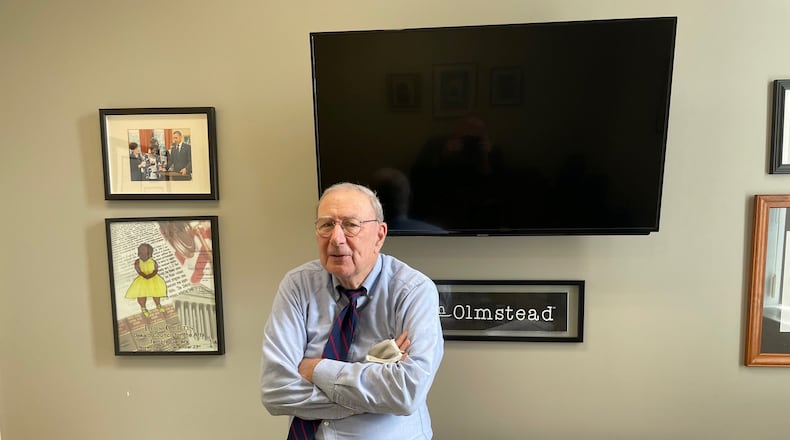Jesus once prognosticated, “The poor you will always have with you.”
Two thousand years has proved him to be spot on. So, that being the case, it can’t hurt to have good lawyers looking after them.
That’s where Atlanta Legal Aid comes in.
Nearly 100 years ago, the organization was founded by E. Smythe Gambrell, a budding silk stocking lawyer who had a soft spot for military veterans being fleeced by “wage buying,” a practice now known as “payday lending.”
For more than half of Atlanta Legal Aid’s history, a fellow named Steve Gottlieb has been there, serving the last 42 years as its leader. Gottlieb, who started as a summer intern in 1968 and joined up as a lawyer a year later, has had a front-row seat to a half century of the cheating, gouging and scamming of the poor.
He’s been there as his organization represented Mariel boatlift refugees from Cuba, won a U.S. Supreme Court case concerning people confined in mental institutions and fought those looking to make a tidy profit from those living in the margins. Atlanta Legal Aid has done all this while absorbing attempts by both Ronald Reagan and Newt Gingrich to defund the organization.
Gottlieb recently announced he’s retiring by year’s end. In recognition, the Georgia Supreme Court this week is presenting the 77-year-old lawyer with its Amicus Curiae Award, one of court’s top Attaboys.
Those in the legal community are lining up to say good things for a guy who has long been a thorn in the side to many.
Credit: JOHN SPINK / AJC
Credit: JOHN SPINK / AJC
“Steve Gottlieb is one of the greatest men I have known,” said former Gov. Roy Barnes. “He has been dedicated to taking care of the people on the shadows of life like abused kids and abused women, taking care of people no one else cares for.”
After losing his reelection bid in 2002, Barnes volunteered to be a unpaid, full-time staff attorney at Atlanta Legal Aid. In fact, he was still governor when he joined up, going, as he puts it, “from the largest office in the city to the smallest.”
Barnes got to know Gottlieb while working alongside Atlanta Legal Aid in the early 1990s against Fleet Finance, a financial firm that sucked millions of dollars from those living in poverty. One of the more notable cases was a grandmother who borrowed $5,000 to fix windows and — after a series of refinancings, compounding 23% interest payments and penalties — was forced to take out another loan committing her to repay $63,000.
It’s expensive to be poor.
Fleet finally agreed to pay $115 million to thousands of Georgia homeowners.
Gottlieb and his org have “bumped heads with everyone,” says Barnes. “They make you uneasy. But that’s what their job is.”
In fact, chalk up the former governor to the “uneasy” category. In March, Atlanta Legal Aid attorneys persuaded the state appeals court to rule against Barnes, who is representing his brother, Ray, the owner of extended stay motels. The legal battle is being waged over evicting tenants and whether the owner is an “innkeeper,” as Barnes contends, or a “landlord,” which affords residents more rights.
Barnes is taking the case to the state Supreme Court but says he doesn’t take the legal pounding personally.
Atlanta Legal Aid has taken up cases unpopular with a large section of the American population. In 1980, perhaps 125,000 Cubans, many with criminal records, left Cuba by boat and ended up on Florida’s shores. Thousands of so-called “Marielitos” were detained in the Atlanta Penitentiary, as the U.S. government couldn’t — or wouldn’t — sort out who was who.
Atlanta Legal Aid argued that indefinite detention was unconstitutional, even if it involved people who were not U.S. citizens. “Scarface,” the 1983 flick starring Al Pacino about the Cuban drug kingpin, convinced many Americans of the prudence of a tough lock-em-up approach. In 2005, the Supreme Court “ruled 7-2 that any inadmissible alien is entitled to release if not deported within six months,” according to the organization’s website.
Credit: AJC file
Credit: AJC file
The legal organization, which five years ago bought a historic downtown building once owned by the Elks Club, now has a Mariel conference room.
When Gottlieb came to Atlanta Legal Aid in 1969 there were just a handful of attorneys. Today there are about 80 lawyers and 150 employees all told. The organization, once funded largely through federal funding, now hits up law firms and foundations for cash, having learned its lesson on government dependence when Reagan and, later, Newt, moved to slash funding.
“Steve Gottlieb said, ‘That will never happen again,’” said Randy Hughes, who retired from a big law firm 15 years ago and has volunteered with the organization since.
In fact, that may be Gottlieb’s legacy: making the organization independent and not to be cowed by those it sometimes offends.
I asked Gottlieb if it has gotten any better after 50 years of fighting for the have-nots?
“I don’t know,” he said with a shrug. “I don’t think the problems will ever end. I just want to do my part to fix inequities. It’s all nice and good to try and change the world. But it’s all about the individual you protect.”
About the Author
Keep Reading
The Latest
Featured




